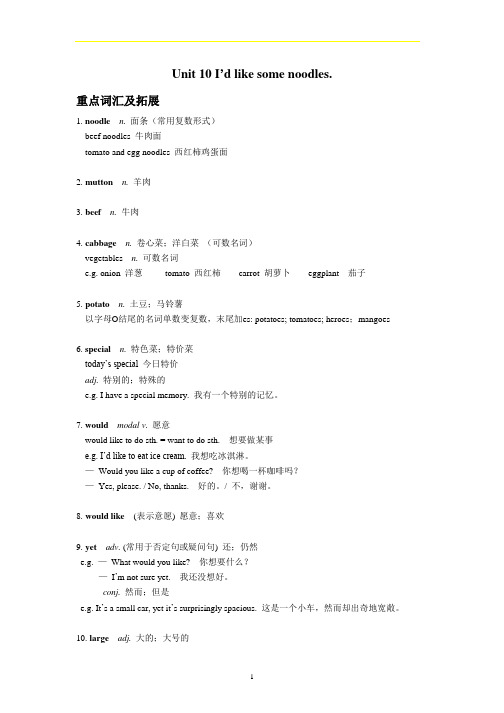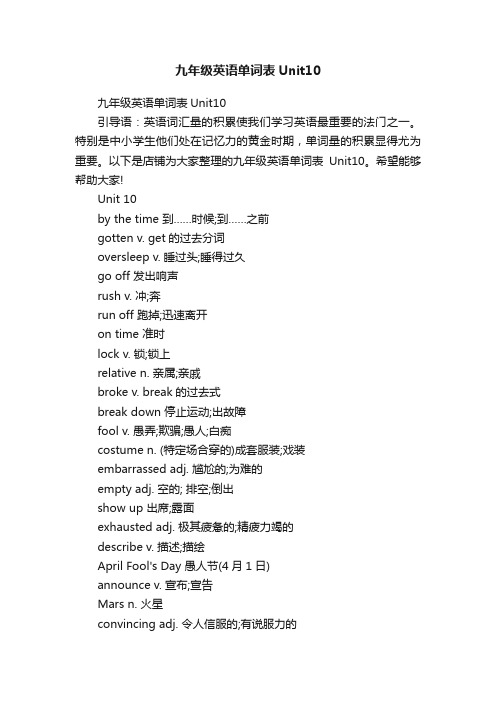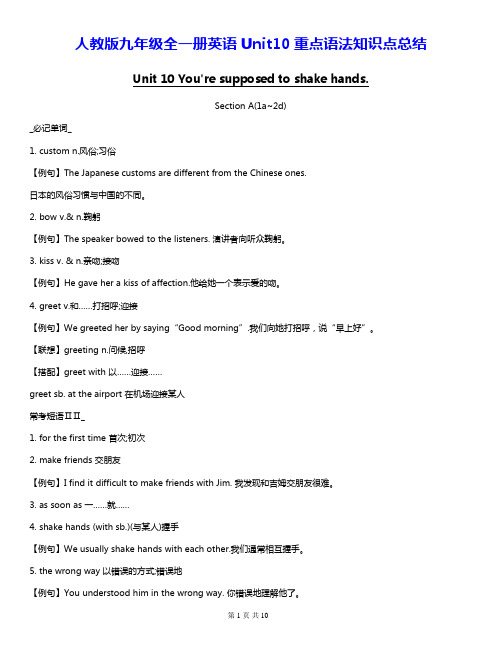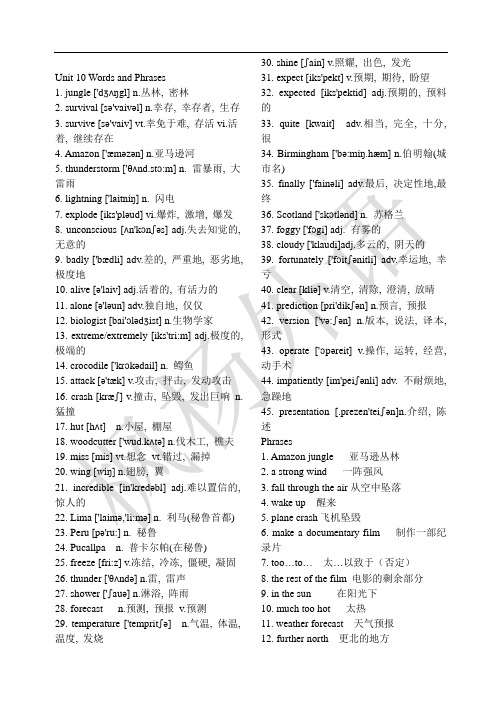unit10
人教版九年级英语全册Unit10单元教学设计

1.培养学生对健康的关注,使其认识到保持良好生活习惯的重要性。
2.增进学生对疾病患者的关爱,学会尊重、理解、帮助他们。
3.通过学习本单元,让学生认识到医学进步对人类健康的重要意义,激发他们对科学研究的兴趣。
4.引导学生树立正确的价值观,关爱生命,珍惜健康,关注社会公共卫生问题。
人教版九年级英语全册Unit10单元教学设计
一、教学目标
(一)知识与技能
1.掌握本单元的生词和短语,如:suffer, serious, disease, survive, recover, symptom, operation, cancer, AIDS等,并能正确运用到实际语境中。
2.学会使用一般现在时和现在进行时描述疾病和健康状况。
4.布置课后作业,要求学生复习本节课所学内容,为新课的学习打下基础。
五、作业布置
为了巩固本单元所学知识,确保学生对词汇、短语、语法和阅读技巧的掌握,特布置以下作业:
1.写作练习:请运用本单元所学的词汇和短语,结合一般现在时、现在进行时、一般过去时和过去完成时等时态,写一篇关于健康生活的短文,字数在100-120词左右。
3.分析课文中的祈使句、感叹句等句型,引导学生学会给出建议、表示关心和慰问。
4.通过对课文内容的分析,让学生了解疾病对人类的影响,培养他们的健康意识。
(三)学生小组讨论
1.教师将学生分成小组,针对以下问题进行讨论:
a. What are the common diseases in our daily life?
四、教学内容与过程
(一)导入新课
1.教师通过展示一组关于健康和疾病的图片,引导学生关注本单元的主题,激发他们的学习兴趣。
人教版七年级下册unit10单词精讲

Unit 10 I’d like some noodles.重点词汇及拓展1. noodle n. 面条(常用复数形式)beef noodles 牛肉面tomato and egg noodles 西红柿鸡蛋面2.mutton n. 羊肉3.beef n. 牛肉4.cabbage n. 卷心菜;洋白菜(可数名词)vegetables n.可数名词e.g. onion 洋葱tomato 西红柿carrot 胡萝卜eggplant 茄子5.potato n. 土豆;马铃薯以字母O结尾的名词单数变复数,末尾加es: potatoes; tomatoes; heroes;mangoes6. special n.特色菜;特价菜today’s special 今日特价adj.特别的;特殊的e.g. I have a special memory. 我有一个特别的记忆。
7. would modal v. 愿意would like to do sth. = want to do sth. 想要做某事e.g. I’d like to eat ice cream. 我想吃冰淇淋。
—Would you like a cup of coffee? 你想喝一杯咖啡吗?—Yes, please. / No, thanks. 好的。
/ 不,谢谢。
8.would like (表示意愿) 愿意;喜欢9.yet adv. (常用于否定句或疑问句) 还;仍然e.g. —What would you like? 你想要什么?—I’m not sure yet. 我还没想好。
conj.然而;但是e.g. It’s a small car, yet it’s surprisingly spacious. 这是一个小车,然而却出奇地宽敞。
10. large adj.大的;大号的a large/medium/small bowl 一个大/中/小碗e.g. He had a large bowl of porridge. 他喝了一大碗粥。
Unit10 知识要点解析

• be worth doing sth 值得做某事,句子主语一般事或物,是do的宾语 • be worth +钱 “值多少钱” • be worth +名词 “值得” • well worth ‘很值得’,不能说 very worth • 【练一练】
_________(握手)with them. • ②当第一次见朋友是,你们应该握手。 • You’re ________ to shake ______ (hand) when you meet your
friends.
3.In the United States, they’re expected to shake hands. 在美国,他们应该握手。
11.If there are people in the meeting room , you are supposed to knock before entering .
• knock v. 敲(门等), 碰撞 • knock at/on the door 敲门 knock into 与......相撞 knock down 撞倒 • 【练一练】用介词at/on,into,down填空 • 1)He knocked ______ the door , but no one answered. • 2)The car knocked ________ the tree last night and the driver hurt. • 3)The boy was knocked ________ by a running bike on the street.
tired.
九年级英语单词表Unit10

九年级英语单词表Unit10九年级英语单词表Unit10引导语:英语词汇量的积累使我们学习英语最重要的法门之一。
特别是中小学生他们处在记忆力的黄金时期,单词量的积累显得尤为重要。
以下是店铺为大家整理的九年级英语单词表Unit10。
希望能够帮助大家!Unit 10by the time 到……时候;到……之前gotten v. get的过去分词oversleep v. 睡过头;睡得过久go off 发出响声rush v. 冲;奔run off 跑掉;迅速离开on time 准时lock v. 锁;锁上relative n. 亲属;亲戚broke v. break的过去式break down 停止运动;出故障fool v. 愚弄;欺骗;愚人;白痴costume n. (特定场合穿的)成套服装;戏装embarrassed adj. 尴尬的;为难的empty adj. 空的; 排空;倒出show up 出席;露面exhausted adj. 极其疲惫的;精疲力竭的describe v. 描述;描绘April Fool's Day 愚人节(4月1日)announce v. 宣布;宣告Mars n. 火星convincing adj. 令人信服的;有说服力的panic n. 恐慌;惊恐set off 激起;引起authority n. 权威机构;行政管理机构reveal v. 揭示;揭露hoax n. 骗局;恶作剧;玩笑flee v. 逃;逃走fled v. flee的过去式和过去分词spaghetti n. 意大利式细面条farmer n. 农夫;农场主sell out 卖完;售光girlfriend n. 女朋友marry v. 嫁;娶;与……结婚thrill v.v. (使)非常激动;(使)非常紧张get married 结婚ending n. 结局;结尾embarrassing adj. 令人尴尬的;令人为难的a piece of 一片;一块Orson Wells 奥森?威尔斯Review of units 6-10Halloween n. 万圣节前夕Holland 荷兰Qomolangma 珠穆朗玛峰(世界第一高峰) 八年级上册英语单词表第二单元Unit2 How often do you exercise? housework ['haswk] n.家务劳动hardly ['hɑdli] adv.几乎不;简直不;刚刚ever ['ev(r)] adv.曾经;在任何时候once [wns] adv.一次;曾经twice [twas] adv.两倍;两次Internet ['ntnet] n.因特网program ['prɡrm] n.节目;程序;课程;节目单full [fl] adj.满的;充满的;完全的swing [sw] n.摇摆;秋千v.摇摆;旋转maybe ['mebi] adv.或许;也许;可能swing dance摇摆舞least [list] adj.最小的;最少的at least至少hardly ever很少;几乎从不;难得junk n.垃圾;废旧杂物coffee ['kfi] n.咖啡;咖啡色health [helθ] n.健康;人的身体或精神状态result [r'zlt] .结果;后果percent [p'sent] adj.百分之...的online [n'lan] adj.在线的adv.在线地television ['telvn] n.电视机;电视节目although [l'] conj.虽然;尽管;然而;可是through [θru] prep.穿过;凭借;一直到body ['bdi] n.身体mind [mand] .头脑;想法;意见;心思such [st] adj.这样的;如此的together [t'ɡe(r)] adv.共同;一起die [da] v.死;枯竭;消失writer ['rat(r)] n.作者;作家dentist ['dentst] n.牙科医生magazine ['mɡzin] n.杂志however [ha'ev(r)] adv.然而;无论如何;不管多么than [n] conj.比almost ['lmst] adv.几乎;差不多none [nn] pron.没有人;没有任何东西,毫无less [les] adj.更少的;较少的point [pnt] n.看法;要点;重点;小数点;目标;分数such as例如;诸如junk food n.垃圾食品;无营养食品more than超过;多于;不仅仅;非常less than不到;少于人教版七年级下册英语单词表curly卷曲的adj./ 'kE:li/straight直的adj./ streit/tall高的adj./ tR:l/medium中等的adj./ 'mi:diEm/height身高;高度n./ hait/of medium height中等身高thin瘦的adj./ Win/heavy重的adj./ 'hevi/build身材n./ bild/of medium build中等身材tonight(在)今晚;(在)今夜adv.&n./ tE'nait/ little小的adj./ 'litl/a little一点;少量cinema电影院n./ 'sinEmE/glasses眼睛n.(pl.)later以后adv.handsome英俊的adj./ 'hAnsEm/actor演员n./ 'AktE/actress女演员n./ 'Aktris/person人n./ 'pE:sn/nose鼻子n./ nEuz/blonde金黄色的adj.mouth嘴n./ mauW/round圆形的adj./ raund/face脸n./ feis/eye眼睛n./ ai/singer歌手n./ 'siNE/artist艺术家n./ 'B:tist/crime犯罪活动n./ kraim/criminal罪犯n./ 'kriminEl/put放v./ put/each每个;各自adj.&pron./ i:tF/way方式;路线n./ wei/describe描述v./ di'skraib/differently不同地adv.another另一;又一adj.&pron./ E'nQTE/end结尾;尽头n./ end/ in the end最后real真正的';真实的adj./ 'riEl/jeans牛仔裤n.八年级下册第七课英语单词表not at all 一点也不turn down 把……调低;关小yard [jɑ:d] n.院子right away 立刻;马上task [tɑ:sk] n.任务;工作;作业poster ['pust] n.海报waitress ['wetrs] n.女服务生brought [br:t] v.bring的过去式solution [s'lu:n] n.解答、解决办法line n.排;队;列wait in line 排队等候annoy ['ni] v.使恼怒,使生气annoyed ['nd] adj.恼怒的,生气的polite [p'lait] adj.有礼貌的;客气的perhaps [p'hps] adv.或许;大概door n.门cut in line 插队hasn't = has notterm [t:m] n.术语etiquette ['et'ket] n.礼节normal ['n:ml] adj.正常的;正规的behavior [b'hevj] n.行为;举止;表现at first 首先Asian ['en, 'en] adj.亚洲的;亚洲人的uncomfortable [n'kmftbl] adj.不舒服的impolite ['mp'lat] adj.无理的;粗鲁的allow ['lau] v.允许; 准许keep …down 控制;抑制voice [vis] n.声音public ['pblik] n.公众take care 当心;小心cough [kf] v.咳嗽sneeze [sni:z] 打喷嚏break [breik] v.打破,违背reak the rule 违反规则politely [p'latl] adv.客气地;斯文地smoke [smuk] v.抽烟;吸烟put out 扑灭、熄灭(火)、关灯cigarette ['siɡ'ret] n.香烟criticize ['kritisaiz] v.批判careful ['kful] adj.当心;小心drop [drp] v.落下;掉下litter ['lit] n.垃圾pick [pik] v.采;摘;挑选pick …up 捡起behave [bi'heiv] v.举止;表现八年级下册英语单词表带音标第六课collect [k'lekt] v.收集;搜集shell [el] n.贝壳;壳marathon ['mr'θn] 体育比赛中)马拉松赛跑pair n.一对;一双skate [skeit] n.溜冰鞋since [sins] 自从;从……以来Hilltop School ['hl'tp] 一学校名称、可译为山顶学校raise [reiz] v.筹集several ['sevrl] 几个的;数个的skater ['sket] n.溜冰者stamp [stmp] n.邮票kite n.风筝monster ['mnst] n.怪物,妖怪globe [ɡlub] n.球状体;球体anyone 任何人run out of 用完;用尽store [st:] v.储存cake n.蛋糕;糕、饼类食品particularly [p'tikjulli] 特别;尤其;异乎寻常的collector [k'lekt] n.收藏家by the way 顺便;附带说说common [kmn] adj.共同的;公共的extra ['ekstr] adj.额外的coin [kin] n.钱币;硬币topic ['tpik] n.话题;主题been v.be的过去分词be interested in 对……感兴趣writer ['rait] n.作家,作者dynasty ['dainsti] n.朝代;王朝character ['krikt] n.(著名的)人物;名人capital ['kpitl] n.省会,首都European ['jr'pi:n] 欧洲的;欧洲人(的) Russian ['rn] adj.俄罗斯的;俄罗斯人(的) Australian [:'streljn] adj.澳大利亚的;澳大利亚人的 n.澳大利亚人Jewish ['du:] adj.犹太人的;犹太族的Jew [du:] n.犹太人thousand ['θaznd] n.一千emperor ['empr] n.皇帝foreigner ['frin] n.外国人quite [kwait] adv.相当;十分certain ['s:tn] adj.确实的;无疑的the Olympic Games ['lmpk] 奥林匹克运动会far away 在远处miss v.思念;想念【九年级英语单词表Unit10】。
人教版九年级全一册英语Unit10重点语法知识点总结

人教版九年级全一册英语Unit10重点语法知识点总结Unit 10 You're supposed to shake hands.Section A(1a~2d)_必记单词_1. custom n.风俗;习俗【例句】The Japanese customs are different from the Chinese ones.日本的风俗习惯与中国的不同。
2. bow v.& n.鞠躬【例句】The speaker bowed to the listeners. 演讲者向听众鞠躬。
3. kiss v. & n.亲吻;接吻【例句】He gave her a kiss of affection.他给她一个表示爱的吻。
4. greet v.和……打招呼;迎接【例句】We greeted her by saying“Good morning”.我们向她打招呼,说“早上好”。
【联想】greeting n.问候,招呼【搭配】greet with 以……迎接……greet sb. at the airport 在机场迎接某人常考短语ⅡⅡ_1. for the first time 首次;初次2. make friends 交朋友【例句】I find it difficult to make friends with Jim. 我发现和吉姆交朋友很难。
3. as soon as 一……就……4. shake hands (with sb.)(与某人)握手【例句】We usually shake hands with each other.我们通常相互握手。
5. the wrong way 以错误的方式;错误地【例句】You understood him in the wrong way. 你错误地理解他了。
6. hold out 伸出(手等)7. greet each other 互相问候8. to one’s surprise 令某人惊讶的是经典句型ⅢⅡ1. That's how people in Japan are expected to greet each other.那就是在日本人们互相问候的方式。
unit10单词表

Unit 10 Words and Phrases1. jungle ['dʒʌŋgl] n.丛林, 密林2. survival [sə'vaivəl] n.幸存, 幸存者, 生存3. survive [sə'vaiv] vt.幸免于难, 存活vi.活着, 继续存在4. Amazon ['æməzən] n.亚马逊河5. thunderstorm ['θʌnd.stɔ:m] n. 雷暴雨, 大雷雨6. lightning ['laitniŋ] n. 闪电7. explode [iks'pləud] vi.爆炸, 激增, 爆发8. unconscious [ʌn'kɔnʃəs] adj.失去知觉的, 无意的9. badly ['bædli] adv.差的, 严重地, 恶劣地, 极度地10. alive [ə'laiv] adj.活着的, 有活力的11. alone [ə'ləun] adv.独自地, 仅仅12. biologist [bai'ɔlədʒist] n.生物学家13. extreme/extremely [iks'tri:m] adj.极度的, 极端的14. crocodile ['krɔkədail] n. 鳄鱼15. attack [ə'tæk] v.攻击, 抨击, 发动攻击16. crash [kræʃ] v.撞击, 坠毁, 发出巨响n.猛撞17. hut [hʌt] n.小屋, 棚屋18. woodcutter ['wud.kʌtə] n.伐木工, 樵夫19. miss [mis] vt.想念vt.错过, 漏掉20. wing [wiŋ] n.翅膀, 翼21. incredible [in'kredəbl] adj.难以置信的, 惊人的22. Lima ['laimə,'li:mə] n. 利马(秘鲁首都)23. Peru [pə'ru:] n. 秘鲁24. Pucallpa n. 普卡尔帕(在秘鲁)25. freeze [fri:z] v.冻结, 冷冻, 僵硬, 凝固26. thunder ['θʌndə] n.雷, 雷声27. shower ['ʃauə] n.淋浴, 阵雨28. forecast n.预测, 预报v.预测29. temperature ['tempritʃə] n.气温, 体温, 温度, 发烧30. shine [ʃain] v.照耀, 出色, 发光31. expect [iks'pekt] v.预期, 期待, 盼望32. expected [iks'pektid] adj.预期的, 预料的33. quite [kwait] adv.相当, 完全, 十分, 很34. Birmingham ['bə:miŋ.hæm] n.伯明翰(城市名)35. finally ['fainəli] adv.最后, 决定性地,最终36. Scotland ['skɔtlənd] n. 苏格兰37. foggy ['fɔgi] adj. 有雾的38. cloudy ['klaudi]adj.多云的, 阴天的39. fortunately ['fɔitʃənitli] adv.幸运地, 幸亏40. clear [kliə] v.清空, 清除, 澄清, 放晴41. prediction [pri'dikʃən] n.预言, 预报42. version ['və:ʃən] n.版本, 说法, 译本, 形式43. operate ['ɔpəreit] v.操作, 运转, 经营, 动手术44. impatiently [im'peiʃənli] adv. 不耐烦地, 急躁地45. presentation [.prezen'teiʃən]n.介绍, 陈述Phrases1. Amazon jungle 亚马逊丛林2. a strong wind 一阵强风3. fall through the air从空中坠落4. wake up 醒来5. plane crash飞机坠毁6. make a documentary film 制作一部纪录片7. too…to…太…以致于(否定)8. the rest of the film 电影的剩余部分9. in the sun 在阳光下10. much too hot 太热11. weather forecast 天气预报12. further north 更北的地方13. no more 不再14. later on 之后,后来15. the Austrian skiing team 奥地利滑雪队16. skiing school 滑雪学校17. win an Olympic Gold medal 赢得一枚奥运会金牌78-80页Pain [pein] n. 疼痛;努力in pain 痛苦vt. 使…痛苦;使…烦恼vi. 感到疼痛;引起疼痛stomach ['stʌmək] n. 胃;腹部;胃口hurt [hə:t] vt. 使受伤;损害;使疼痛;使痛心get hurt 受伤vi. 感到疼痛;有坏处;带来痛苦hurt badly 头痛的厉害,严重受伤[ 过去式hurt 过去分词hurt 现在分词hurting ]press [pres] vt. 压;按;逼迫;紧抱vi. 压;逼;重压n. 压;按;新闻;出版社;[印刷] 印刷机whatever [hwɔt'evə, 'hwət-] adj. 不管什么样的pron. 无论什么;诸如此类conj. 无论什么weird [wiəd] adj. 怪异的;不可思议的;超自然的gone [ɡɔn] adj. 离去的;死去的;用光的v. 去(go的过去分词)wimp [wimp] n. 懦弱的人;无能的人aspirin ['æspərin] n. 阿司匹林(解热镇痛药)compulsory [kəm'pʌlsəri] adj. 义务的;必修的;被强制的n. (花样滑冰、竞技体操等的)规定动作[ 复数compulsories ]scheme [ski:m] n. 计划;组合;体制;诡计vi. 搞阴谋;拟订计划vt. 计划;策划[ 过去式schemed 过去分词schemed 现在分词scheming]marta viera da silva 玛尔塔维埃拉达席尔瓦Swedishadj. 瑞典的;瑞典语的;瑞典人的n. 瑞典语;瑞典人词组1、have got a pain in感到疼痛2、right here就是这里3、keep on doing继续做某事It's easy to keep on doing things the same way as before.像以前那样不变地做一件事很容易。
人教版九年级英语课件:Unit10(共35张PPT)
课堂同步
一、阅读课本第74页2d,回答问题。 1.What is the funny thing happened at the party? J_o_h_n_m__et__a _J_a_p_an_e_s_e__b_o_y,_a_n_d_a_s_s_o_o_n__a_s _h_e_h_e_l_d_o_u_t_ h_i_s_h_a_n_d_,t_h_e_b_o_y__b_o_w_e_d_._______________________ 2.How are Japanese people expected to greet each
A. invented B. discovered
C. found
D. found out
课堂同步
阅读课本第75页3a,判断正误。正确的写“T”,错 误的写“F”。
(T )1.It is important for people in Colombia to spend time with family and friends.
friends in our everyday lives. 我们特别珍惜平日生活中和家人、朋友在一起的时光。 spend time with sb. 与某人共度时光 如:He will not come. He spends all his free time with his
family. 他不会来。他所有的空闲时间都和他的家人在一起。
知识拓展
(1)若表示“在……上花费(时间、金钱等)”,常用句 型spend some money / some time on sth.,介词on后面 接名词或代词。 如:Kitty spends two hours on her homework every day. 凯蒂每天花两个小时做家庭作业。
九年级英语UNIT10单元短语句子
Unit10Phrases:1 shake hands 握手2 make mistakes 犯错误3 hold out my hand 伸出手4 find out 查明;发现5 be supposed to / be expected to 应当6 next time 下次7 to one’s surprise 另。
惊奇的是8 each other 彼此;相互;互相9 an exchange student 交换生10 meet for the first time 第一次11 as soon as 一。
就。
12 expect (sb) to do sth 期待做某事13 drop by 顺便访问;随便进入14 after all 毕竟;终归15 make an effort 做出努力16clean .. off 把。
擦掉17 make plans to do 制定计划做某事18 take off 脱下(衣服);(飞机等)起飞19 work with sb与。
合作20 go out of one’s way 特地;格外努力21 make...feel at home 使(某人)宾至如归22 point at 指着23 get used to doing 习惯于24 table manners 餐桌礼仪25 stick into 把。
插入26 host family 房东27 main ideas 主要意思28 because of 因为29 be different from 与。
不同30 cut sth up 把。
切碎31 show up 出现;露面32 learn about 了解33 look forward to doing 期待;期望34 at first 首先35 be comfortable doing sth 顺畅地做某事36 keep sb doing sth 让。
一直做某事37 make a list of 列。
人教版英语七年级下Unit10单词、知识梳理、词汇句式精讲
人教版英语七年级下Unit10单词、知识梳理、词汇句式精讲Unit10 单词(音标)noodle ['nuːdl] n. 面条mutton ['mʌtn] n. 羊肉beef [biːf] n. 牛肉cabbage ['kæbɪdʒ] n. 卷心菜;洋白菜potato [pə'teɪtəʊ] n.土豆;马铃薯special ['speʃəl] n.特色菜;特价品adj. 特别的;特殊的would [wʊd] modal v.(表示意愿)愿意would like愿意;喜欢yet [jet] adv. (常用于否定句和疑问句)还;仍然large [lɑː(r)dʒ] adj.大号的,大的order ['ɔː(r)də(r)] n.&v. 点菜;命令takeone’s order 点菜size [saɪz] n. 大小;尺码bowl [bəʊl] n. 碗one(large) bowl of…一(大)碗tofe [təʊfu:] n. 豆腐meat [miːt] n. (可食用的)肉dumpling ['dʌmplɪŋ] n.饺子porridge ['pɒrɪdʒ] n. 粥;面糊onion ['ʌnjən] n. 洋葱fish [fɪʃ] n. 鱼;鱼肉pancake ['pænkeɪk] 烙饼;薄饼world [wɜː(r)ld] n. 世界aroundthe world世界各地answer ['ɑːnsə] v. 回答n. 答案different ['dɪfərənt] adj.不同的cake [keɪk] n. 蛋糕candle ['kændl] n. 蜡烛age [eɪdʒ] n. 年龄makea wish许愿blow [bləʊ] v. 吹blowout吹灭if [ɪf] conj. 如果will [wɪl] v. 将要;会the UK(=theUnited Kingdom) [,ju:’keɪ]([jʊ'naɪtɪd ‘kɪŋdəm]) n.英国candy ['kændi] n. 糖果lucky ['lʌki] adj. 幸运的popular ['pɒpjʊlə] adj.受欢迎的;普遍的getpopular受欢迎;流行cutup切碎idea [aɪ'dɪə] n.想法;主意bring good luck to…给……带来好运Unit10 知识梳理【重点短语】1. would like sth. 想要某物2. would like to do sth. 想要做某事3. put on 穿上,戴上4. take one’s order 点菜5. in the beef noodles 在牛肉面里6. mapo tofu with rice麻婆豆腐外带大米7. what kind of noodles什么种类的面条8. a large bowl of noodles一大碗面条9. a medium bowl of noodles 一中碗面10. a small bowl of noodles 一小碗面条11. what size 什么尺寸12.May I take your order? 可以点餐了么?13. beef noodles with carrots带有胡萝卜的牛肉面14. green tea 绿茶15. orange juice 橙汁16. around the world 世界各地17. in different countries 在不同的国家18. birthday cakes with candles带蜡烛的生日蛋糕19. the birthday person 寿星20.make a wish 许愿21. blow out the candles 吹灭蜡烛22. in one go 一口气,一次性的23. come true 实现24. get popular 变得流行,受欢迎25. long noodles 长寿面26. cut up 切碎/断27. a symbol of long life 长寿的象征28. be different 不同的29. be the same 一样的30. bring good luck to sb. 带给某人幸运31. have different kinds of …有不同种类的......【重点句型】1. What would you like?您需要什么?2. I'm not sure yet. Are there any vegetables in the beef noodles? 我不确定,牛肉面里有蔬菜吗?3. Yes, there are some tomatoes.有,里面有西红柿。
Unit10大单元整体教学设计人教版英语九年级全册
1.能够用动词不定式谈论习俗和首次见面时应该怎么做。
2.指导学生通过开展小组学习活动,培养协作意识。
3.通过学习,了解不同国家的文化知识,从而学会尊重不同的文化,养成良好的行为习惯。
1.重点:学习和练习用动词不定式谈论习俗和首次见面时应该怎么做。
2.难点:总结动词不定式的用法。
4.借助思维导图对文章关键内容进行复述。
5.让学生在听说读的基础上,有条理地输出语言。有条理并且有逻辑地进行语言输出,运用重点句型be supposed to, be expected to, It’s polite to进行写作。
单元
课时安排
教学内容
教学目标
教学重难点
Period ⅠSection A(1~2d)
Period Ⅳ
Section B(2a~2d)
1.教会学生读懂关于异国生活习俗的建议信。
2.掌握并运用阅读短文中的重点词汇和语言结构。
3.学会整理读书笔记。
1.通过对短文的阅读和复述,培养及时记忆的能力。
2.指导学生开展小组活动,培养协作意识。
3.指导学生了解不同国家的餐桌礼仪,提高对文明生活的知识。
1.复习已经学过的有关时间观念和礼仪方面的词汇。
2.口头掌握句型:
It's polite for boys to shake hands.
It's impolite to keep others waiting.
It's important to be on time.
3.学习和练习用动词不定式谈论习俗和首次见面时应该怎么做。
3.能综合运用本单元所学的重点句型You are (not) supposed / expected to do...和It’s polite / impolite to do...等来介绍中国的风俗礼仪。
- 1、下载文档前请自行甄别文档内容的完整性,平台不提供额外的编辑、内容补充、找答案等附加服务。
- 2、"仅部分预览"的文档,不可在线预览部分如存在完整性等问题,可反馈申请退款(可完整预览的文档不适用该条件!)。
- 3、如文档侵犯您的权益,请联系客服反馈,我们会尽快为您处理(人工客服工作时间:9:00-18:30)。
Unit 10 I’ve had this bike for three years.Period 1 Section A 1a-2d【学习目标】1、知识与能力:(1)认知并熟练运用本课时重要单词和词组;(2)能听懂谈论人们拥有某物多长时间的话题,能熟练运用since, for 谈论自己的个人物品。
(3)掌握并灵活应用以下交际用语:How long have you had that bike over there?I’ve had it for three years.How long has his son owned the train and railway set?He’s owned it since his fourth birthday.Have you ever played football?Yes, I did when I was little, but I haven’t played for a while now.2、过程与方法:学生自主预习,教师主导,小组交流,合作探究3、情感态度价值观:正确处理并充分利用自己的废旧物品。
【学习重点】:会运用现在完成时。
【学习过程】一、课前预习(一)预习任务:Task1: 朗读并识记P73-P74的单词,根据汉语意思写出下列单词院子______________ 甜蜜的,甜的;含糖的_____________ 记忆;回忆______________ 分,粉笔______________玩具______________ 熊_____________生产者;制造者______________围巾;披巾;头巾______________软的;柔软的______________ 检查;审查______________ 板;木板__________Task2: 重点词组识记庭院拍卖会______________ 面包机______________ 软体玩具;布绒玩具______________ 察看;观察______________ 棋类游戏______________Task3: 句型展示你拥有那辆自行车多久了?__________________?我拥有它三年了。
_________________..(二)预习诊断:1. 你也能把这些旧物品捐赠给需要的人。
You can also _______ old things ________ to people in need.2.你能付75美分买它。
You can ______ it _____ 75 cents.3.我买着本杂志几个月了。
I’ve _______thismagazine______________ _________ ________months.4. 自从我是一个孩子的时候我就拥有它们。
I'vehadthem_____I _____a child.(三)预习质疑________________________________________________________________ 二、课中实施一、精讲点拨1. --How long have you had that bike there?--I have had it for three years辨析:how long, how soon, how often, how farHow long 多久,多长(时间)。
对时间段提问,如:for+时间段;since+过去的时间点。
e.g. --How long have you worked in Beijing?--For five years.How soon 多久以后。
对“in+时间段提问,常用于一般将来时”,其答语常用“in+时间段”。
e.g. –How soon will Mr. Li be back?--In a week.How often 多久一次,对频率提问,其答语为:once(twice/…)+时间段,always,usually 等。
e.g. --How often do you exercise?-- Once a day.How far 多远,对距离提问,其答语是表距离的内容。
e.g. --How far is it from here to your school?-- Three kilometers.辨析:for 与sincefor其后只能接表示“一段时间”的名词性短语,可用于多种时态,表示动作或状态持续时间段长短。
e.g. I have lived in this city for five years. 我在这座城市居住了5年了。
He usually sleeps for twelve hours every day. 他通常每天睡12个小时。
since 其后接表示“时间点”的短语或从句(过去时),也可以接“一段时间+ago”,常用于完成时态;还用于句型:“It is +时间段+since+一般过去时的句子”。
表示过去某个时间发生并持续到说话时的动作或状态。
e.g. It is two years since I came to China. 自从我到中国以来已经两年了。
She has worked here for five years. =She has worked here since five years ago.她在这儿工作5年了。
2. Jeff’s family is having a yard sale.sale用作名词,意为“出售,销售”,on sale意为“出售,上市”;for sale意为“待售,供出售”,尤指从主人手里出售。
e.g. Chickens are on sale in the market.小鸡在市场上出售。
I’m sorry, it’s not for sale.抱歉,它不出售。
3. Amy thinks it’s hard to sell her old things.艾米认为卖掉她的旧东西很难。
It’s +adj. (+for sb.) to do sth. 意为“(对某人来说)做某事时……的”,it 是形式主语,真正主语是后面的动词不定式。
e.g. It’s important for un to learn English well.学好英语对于我们来说是很重要的。
4. Amy wants to keep her old things because they bring back sweet memories.艾米想保留她的旧东西,因为它们勾起她的甜蜜回忆。
memory n. ,意为“记忆;回忆”,复数形式为memories,动词为memorize,意为“记忆,背诵”。
e.g. She has a good memory. 她记忆力好。
5. I’ve had this magazine for a couple of months. 这本杂志我买了几个月了。
a couple of 表示具体的数量“两个”,指两个相同的人或物体; 表示数量不定的“少数几个”,作这种虚指的用法时,具体意思往往视上下文和具体的语境而决定,例如:You have to wait for a couple of hours for the clothes to dry completely.你得等上一两个小时让这些衣服完全晾干。
6. The stories inside may be a bit old, but they’re still interesting.a bit 意为“一点儿,稍微”,修饰形容词或副词,相当于a little;a bit of +不可数名词,a little直接加不可数名词。
e.g. There is a bit of/a little water in the bottle.瓶子里有点儿水。
not a bit =not at all 意为“一点也不”not a little =very 意为“非常”e,g. She is not a bit happy. 她一点儿也不快乐。
He is not a little tired.=He is very tired. 他非常累。
7. And check out these soft toys and board games for younger kids.check用作及物动词,意为“检查,审查”,短语check out,意为“察看,观察”。
e.g. If you finish it,check it by yourself first.如果你完成了,就自己先检查一下。
Check out all the books for children.察看一下所有的儿童书籍。
check 还可用作名词,意为“支票。
账单”三、系统总结:本节课我学到了____________________________________________限时作业1. -- ____ have you been married?-- For twenty years.A. How farB. How oftenC. How longD. How soon2. If you sit in a chair ____ a long time, your back may begin to hurt.A. atB. inC. onD. for3. -- I often have hamburgers for lunch.--You’d better not. It’s bad for you ____ too much junk food.A. eatB. to eatC. eatingD. ate4. --- When did you _______ the bike?--- in 2012 . I have ______ it for two years.A.buy ; boughtB.have ; boughtC. buy ; hadD.bought; bought5. --- How long has Mr.Green lived in Lanzhou?--- He’s lived here ______ 1998.A. forB. sinceC. atD. on用所给词的适当形式填空1. Mr Brown is the ______(make)ofthefood.2.Myfather_____(work) in the middle school for 20 years.3. These ______ (scarf) are Ann’s and Alice’s.4. Ann has had the sweater since she _______(be)fiveyearsold.5.Ithinkit'shard______(ride)ahorse.It'sdangerous.Period 2 Section A 3a-3c设计人:潘敏【学习目标】1、知识与能力:(1)认知并熟练运用本课时重要单词和词组;(2)掌握并灵活应用以下交际用语:How long have you had that bike over there?I’ve had it for three years.How long has his son owned the train and railway set?He’s owned it since his fourth birthday.Have you ever played football?Yes, I did when I was little, but I haven’t played for a while now.2、过程与方法:学生自主预习,教师主导,小组交流,合作探究3、情感态度价值观:正确处理并充分利用自己的废旧物品。
